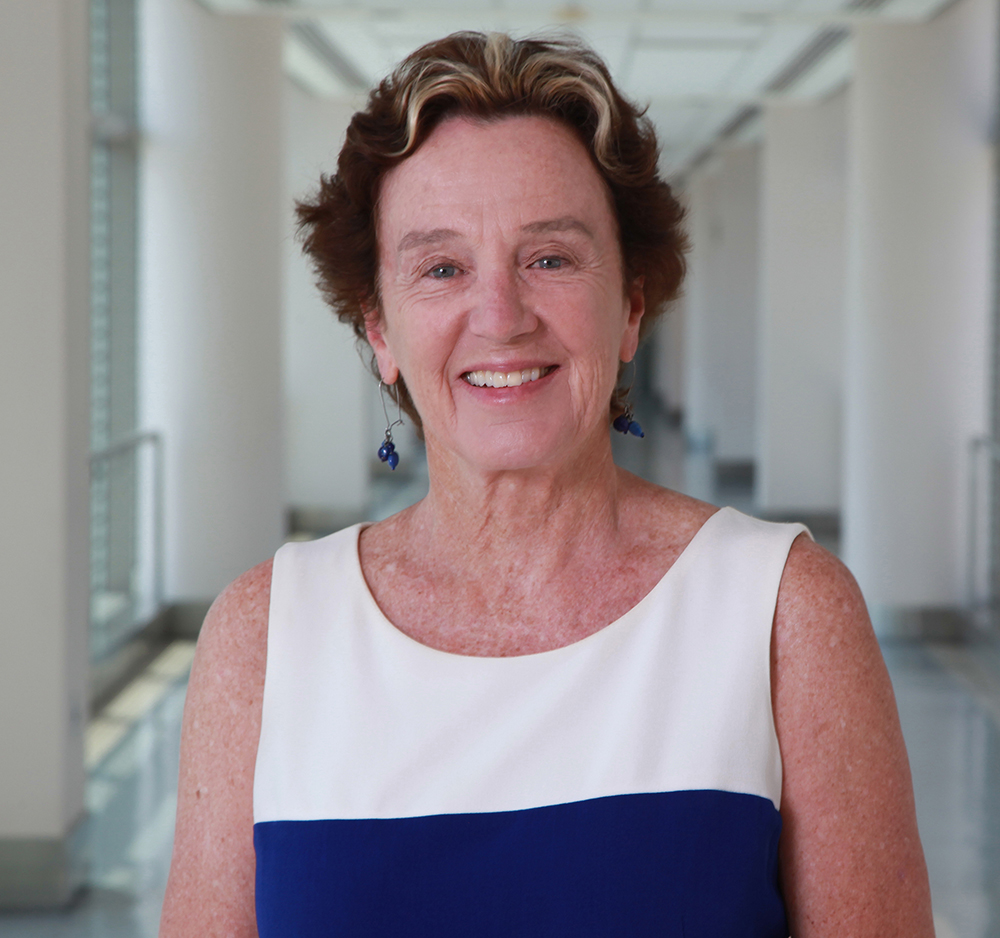UMB Commencement 2022: Honorary Degree Recipient Christine Grady, PhD, MSN
May 04, 2022 Jen Badie
Nurse-bioethicist and chief of the Department of Bioethics at the National Institutes of Health Clinical Center honored for her many contributions, including her research during the COVID-19 pandemic.
Nurse-bioethicist Christine Grady, PhD, MSN, has had a front-row seat to the United States’ response to COVID-19 for the past two years and hopes the one thing that Americans learn from the pandemic is to care for each other.
Grady, who has served as chief of the Department of Bioethics at the National Institutes of Health (NIH) Clinical Center for the past 10 years, has studied ethical implications of the pandemic such as the inequities of treatment, rollout of the vaccines, and effects of the pandemic on nurses.
“There are so many important ethical challenges that emerged during COVID,” said Grady, who is also senior investigator at the NIH Clinical Center. “One very large and complex ethical challenge that COVID has shined a light on is inequity — in society and in health care. We must all work to correct inequities.”
Grady’s work is known internationally, and she has lectured on ethical issues in clinical research and clinical care, HIV disease, and nursing. Her research has focused on the ethics of clinical research, including informed consent, vulnerability, study design, and recruitment as well as ethical issues faced by nurses and other health care providers.
“Being an early nurse-bioethicist has given me the opportunity to synergize what I learned from both nursing and bioethics to deliver high-quality consultation, education, and research and move the field forward,” Grady said.
For her many accomplishments, the University of Maryland, Baltimore (UMB) will honor Grady with an Honorary Doctor of Public Service degree at its commencement May 19. Her husband, Anthony Fauci, MD, director of the National Institute of Allergy and Infectious Diseases, will give the keynote speech and also receive an Honorary Doctor of Public Service degree.
“I was very surprised and truly honored to be recognized in this way,” said Grady, who described herself as “an enthusiastic supporter” of UMB’s mission to improve the human condition and serve the public good. “It is also exciting to be receiving an honorary doctorate along with my husband.”
Fauci, the chief medical advisor to President Joe Biden, calls Grady his rock and his anchor.
“She’s intellectually brilliant, but she also has incredibly good judgment and has a different personality profile than mine. She’s very calm, very reserved, but a very analytical thinker,” Fauci said. “And with all the pressure that I’m under, which is considerable, she keeps me well-grounded and focused on what’s important. And she helps me to not let things distract me that are ridiculous.
“She’s the balance. She’s the anchor of reality in my life — not to mention the fact that she’s an accomplished person on her own.”
Grady said her advice to Fauci over the past two years, which have seen him come under attack from those who have spread misinformation about the pandemic and vaccines, has been “to take care of himself, push the science forward, and explain things as clearly as possible.”
Grady has written more than 175 papers in biomedical and bioethics literature including several papers studying ethical issues during the pandemic.
In May 2020, she co-wrote “COVID‐19: Ethical Challenges for Nurses,” which focused on the safety of nurses, patients, colleagues, and families; the allocation of scarce resources; and the changing nature of nurses’ relationships with patients and families. Grady and her co-authors urged nurses to seek support during the pandemic and policymakers “to ensure that nurses’ voices and perspectives are integrated into both local and global decision‐making so as to minimize the structural injustices many nurses have faced.”
She also has given talks on the pandemic including “Vaccine Development: The Case of COVID-19” in which she discussed the ethical challenges of the vaccines’ development and testing, distribution and allocation, and public health and social acceptability. She noted that an ethical framework includes fair subject selection, favorable risk-benefit, informed consent, and independent review.
Grady also has written or edited several books, including “The Oxford Textbook of Clinical Research Ethics” and “The Search for an AIDS Vaccine: Ethical Issues in the Development and Testing of a Preventive HIV Vaccine.”
She served on the President’s Commission for the Study of Bioethical Issues from 2010 to 2017. She is an elected fellow of the Hastings Center and the American Academy of Nursing, a senior research fellow at the Kennedy Institute of Ethics, and an elected member of the National Academy of Medicine. She has received numerous awards, including the NIH CEO Award in 2017 and the NIH Director’s Award in 2015, 2017, and most recently in 2021 for identifying and navigating ethical challenges related to the COVID-19 pandemic.
She earned her BS in nursing and biology and her PhD in philosophy from Georgetown University and her MSN in community health nursing from Boston College.
Despite her many accomplishments, Grady says she still has at least one goal she wants to achieve.
“I want to find ways to promote moral strength and moral decision-making, and to mitigate moral distress experienced by nurses, health care professionals, and others,” she said.
Read about all of the commencement honorees at this link.